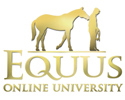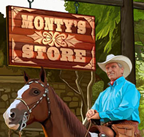I have tried the join up with her twice now. I can get to the ear in my direction and smaller circles but that it's it. She would run and run if I let her. I am not sure if I should wait longer and let her get more comfortable with me before attempting again?
There is also the question of the foal. The first time I had my daughter tie her just outside the arena so mamma could see her but she kept trying to stop at her baby. The second time I had the foal with mom and tried to do the join up with them together. That time it took us almost an hour to catch her after attempting join up.
Does anyone have any suggestions? I don't see any questions regarding mare and their foals. I am just wondering how to handle them, together or separate?
Thank you!!




Am so glad to see this question and thread and Jo’s answer is right on point. Welcome and please keep us updated on your progress.
Enjoy,
Tara
A) Breathing. We all do it but controlling how you breath can influence horses. Diaphragmatic slower breathing (like singers) extends your vocal chords, lowers your adrenaline & helps you be calm - horses read this in you & follow suit. Shallow, rapid breathing will cause horses to be more reactive, to speed up & keep a greater distance.
B) Body language. Horses use body language & so do we. Horses read our body language. Rapid, jerky movements unsettle & spook horses. For instance, in Join up, the trainer squares up their shoulders, looks directly at the horses eye & opens their fingers wide (like claws) to drive the horse to go away. To invite the horse into our space we move our body/shoulders from square on to a 45 degree angle, close our fingers & move our line of sight down. The horse is still in our peripheral vision but by training our eyes not to stare or flash about we can cause the horse to be more calm & feel more safe in our company.
C) Responsibility. Humans must accept all responsibility with horses. Foals & horses have instinctive reactions & learned responses. If a foal or a horse is unfairly, brutally treated it will remember it. They will associate that experience with a situation not the individual human. We may unwittingly trigger a 'negative response'. Nevertheless, it's us, the human, who have triggered that reaction - the horse has simply reacted instinctively. There is NO FAULT on the part of the horse. It's the trainers responsibility to be a trusted leader for the horse. To give clear signals, to be patient enough to allow the horse or foal to learn incrementally at their own speed - there genuinely are no short cuts but that doesn't mean progress is necessarily slow. We must remain calm & consistent whilst also being alert so as to ensure our own safety as well as the safety of our horse & foal.
Three not overly long paragraphs that cover an immense amount of ground. I really hope they help you to gain even more advantage from the lessons you study on the Uni & in turn, assist you towards your goals. If you can take the time to visit previous posts on the forum there is a wealth of information there, not to mention other people sharing difficult situations - you are so NOT ALONE. Cheers, Jo.
After what your mare and foal has been through, you are God send to them. I hope that you feel really good about this, because I do.
Jo has given you a wealth of information, and if followed, it should put you in a very good scenario with both horses.. I have raised 30 babies in my life and can tell you without any hesitation that your relationship with the mare is of vital importance. Your mare must be able to feel that she will be the most loved, well care-fore mother of all time with you and your family. The way I see the mares is they are the key to any successful horse operation whether it be two horses or two hundred. So I would encourage you to do something each and every day with your mare, but whatever it is, it must include the foal. I am speaking now of grooming, cleaning out the hooves and just talking with her with your arms around her. Tell her how very beautiful her baby is and just maybe you will get to scratch the baby during one of these sessions. Hopefully, this attention by you will lead to a strong trust in your leadership by them. As mentioned by Jo about taking walks with them, I am a believer in spirit walks around the farm. It is at this time that we humans learn the lessons that horses can teach us. We just have watch and listen carefully.
The only other thing that I might mention to you is in regard to the weaning process. If you can allow that process to happen naturally, everyone wins. Weaning of foals is one of the single hardest times for a young horse to go through.. We always waited for them to be 5-6 months old and always kept them next to each other. It was still a hard time.. With that said, I can say without any doubt that is a very hard time for both mare and baby. If possible, go naturally...
Thanking you again
Bud